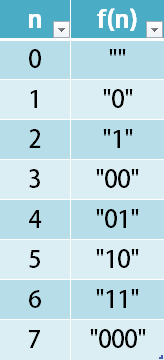Welcome to Subscribe On Youtube
1256. Encode Number
Description
Given a non-negative integer num, Return its encoding string.
The encoding is done by converting the integer to a string using a secret function that you should deduce from the following table:

Example 1:
Input: num = 23 Output: "1000"
Example 2:
Input: num = 107 Output: "101100"
Constraints:
0 <= num <= 10^9
Solutions
Solution 1: Bit Manipulation
We add one to $num$, then convert it to a binary string and remove the highest bit $1$.
The time complexity is $O(\log n)$, and the space complexity is $O(\log n)$. Where $n$ is the size of $num$.
-
class Solution { public String encode(int num) { return Integer.toBinaryString(num + 1).substring(1); } } -
class Solution { public: string encode(int num) { bitset<32> bs(++num); string ans = bs.to_string(); int i = 0; while (ans[i] == '0') { ++i; } return ans.substr(i + 1); } }; -
class Solution: def encode(self, num: int) -> str: return bin(num + 1)[3:] -
func encode(num int) string { num++ s := strconv.FormatInt(int64(num), 2) return s[1:] } -
function encode(num: number): string { ++num; let s = num.toString(2); return s.slice(1); }